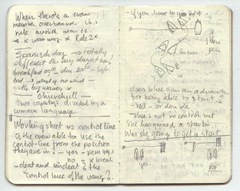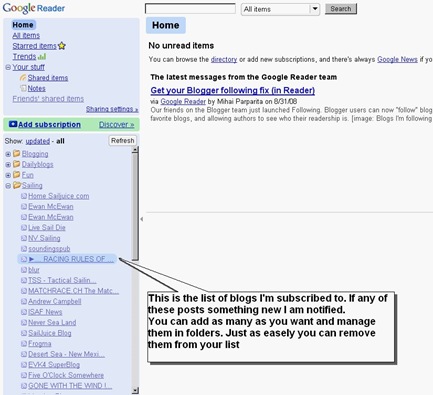For an introduction see: 'Flog the Blog' Day (6)
After the questions I put my initial answer (from 24/01/2008) first and my "today' answer (from 18/05/2008) in light blue:
Q1: Why did you start the blog?
A: I already had a web-site on the rules which I started in December 2005. But I'm not schooled in web-design or html nor have the time to learn it, so maintaining a good attractive site, was a real chore. I almost never did anything new. I had no contact with readers, save for an occasional E-mail.
When last year I stumbled on a blog, looked around and found out how easy it was to make one and maintain, I immediately started. As a first post I put all the old stuff from my web site on it and well, just started.
There are several reasons why I wanted a place on the world wide web. When I studied for International Judges Exam back in 2004, the participants of the seminar formed a study-group - called LOOK TO WINDWARD, hence the name for my blog - before the seminar and talked about rules, exchanged tests, discussed cases and corresponded (by E-mail). It was a great way to get some necessary skill in reading, writing and understanding English, learning more about the RRS and getting to know fellow judges from all over the world. It was a great help in passing the exam.

The classroom from my 2004 IJ seminar
So my first reason was to find a way to do this for other seminar participants and race officials. Especially for people who don’t have a Member National Authority who can help them develop in Race Officiating. Countries like England or the USA have a fully organized development program for judges, umpires and race officers, but what about that guy in Slovenia or Thailand or Uruguay? He has to do it practically on his own.
Secondly I wanted to keep up my English skills. Only reading in a language is not enough, I wanted to continue to write in it as well. I could do a blog in only my native language (Dutch) but then my readers would be only local. I occasionally do a piece in Dutch to keep in touch with the home base, but try to keep it International for the most part.
And finally, it's a great way to stay on top of the rules. All judges and umpires have to do that, to keep up there expertise and knowledge.
Q2: What is the most challenging aspect about maintaining the blog?
A: Finding enough time to do it. I find myself getting less and less sleep..... I do have a regular job which takes up most of my days and keeps me pretty busy. I also have other commitments to clubs and to my MNA, teaching and giving lectures about the rules. I volunteer for two local Yacht clubs and help prepare regatta’s and events, and of course do judging, umpiring and RO-ing. At the moment it's winter over here so there are not too much events, but that will change soon. I don't know if I can keep posting on a daily bases at an event.....
Oh, there’s one challenging issue a reader comes back to, every change he or she - it’s an Anony(mouse) poster – gets: my blog’s black background and white lettering… should I change to dark lettering on a light background or not…. I can’t decide.
By adopting a couple of strategies I learned from fellow bloggers ( Skelliewag.org; Blogger Buster) I find it easier to post on a daily base, then say, a couple of months back. I keep a notebook (always with me) write idea's in it whenever I have one, use Google Notebook and docs. Post in a couple of forums and subscribe to a couple of dozen other blogs to keep informed. I've become a little more confident, I can keep this up. And the black will stay - for now.

a page from my notebook
Q3: Do you feel any pressure to post on a consistent basis?
A: Not at the moment. For me this is relatively new and therefore still fun and exiting to do. I can see this becoming more and more an issue after a longer time, when I run out of new things to say. Perhaps the frequency in posts will drop after a while, but for now I want to build a place where everybody involved with the rules, visits now and then. In order to get there I have to keep everybody interested by doing at least one post a day.
Still don't feel pressured, but committed. Something I want to do. I suppose that could be considered pressure from within?
Q4: How do you keep the blog fresh; how do you decide what to write about?
A: The subject matter of my blog is pretty narrow. At least for now I try to stick to the Racing Rules of Sailing, Protests and all aspects of race officiating. With sometimes a little sidetrack to my personal experiences and events I've been to, but only as long as I think there's a tip or lesson or trick which might benefit others. I don't want to stray to much from that premise. This means I don't have to decide about the subject, only find something worthwhile to post about. If all fails, I do a new situation, draw a diagram and discus the rules involved.
To find suitable material, I look for it on the Internet, use material I've gathered over the years and ask others about it. I'm reading books and articles about it.
I keep a Google notebook, write down all new ideas and prepare drafts. If I have an "off" day or not enough time to write something new, I use a pre-prepared post. I also have a list of subjects for each day of the week and try to stick to that. i.e. Monday: rules-test, Tuesday: race management, Wednesday: NED (something in Dutch) etc. etc. Some of the post I have to prepare and that takes a couple of days or longer to get the necessary information or check my assumptions. Other post are decided pretty much spur of the moment, when I come across a interesting file or tidbit on the net. Those can be translated into a post, with a link or two, in five minutes. I already get an occasional request for a specific subject or case from readers and hope those will increase, so I can use them in a post.
I've permitted myself a little more leeway in writing posts. For example about doing this in the first place.
What I want/need is a little more levity, something funny, but also recurring.... Like Fish on Friday or Mermaids.... Still haven't found it, but am always on the lookout <G>. Any Ideas?
Q5: Any advice to would-be bloggers?
A: I consider myself a newcomer, who still has to learn a lot. I spent about a quarter of my time on the net looking for ways to improve, by reading about blogging, looking at other blogs to see how it's done and experimenting with new features. To start is easy enough. I have found a lot of blogs who never get any further than that. After a couple of posts the whole thing sizzles out. I'm determined not to have that happen to mine, but ask me again in a year.
Would-be bloggers should have at least that commitment. Read a little on blogging before you start, and - but that’s true for every writer - find something to write about you know.
Or write very well, then you can get away with any subject.....
Commitment is still the driving factor; If you don't have that, it will not happen.
Q6: How has the feedback/commentary been from the online community?
A: Positive for the most part. I do know how many people visit my pages. If I measure that against people who actually respond or leave a comment, it's very few. But those that do, are coming back and give me constructive feedback, with only one or two exceptions. I myself still have to get used to this blogging community and have to find a way to behave in that world. I imagine this is the same for most visitors to my blog. I'll be patient and let things grow.
I still need to get more involved in the community... I'm envious of all those bloggers who can find something funny or meaningful to write on someone else's posts. I wish I could do that. I'm trying, but am not altogether comfortable with what I write. English is very rich in "sub context". How you write it, is sometimes more important than what you write.... That's very hard to learn.
Comments have been great and more and more of them have appeared. I try to respond to all mails and comments, but sometimes it takes a couple of days to find the time to do it.
Q7: How has the feedback been from your real-world, local community about your blog?
A: Also mostly very positive. Most of my fellow race officials whom I have told and have visited, come back on a regular basis. I seem to have found something they did not have before and find useful. I'm still in the building stage and am looking for ways to tell people about it. I try to exchange links with other sites, include my blog address in all my mails and bring up the subject in conversation when appropriate. I'm trying not to be too bold about it and keep things out of any commercial realm. I don't have Adsense and I will not in the future.
I also have made some tentative openings to people from ISAF and a few MNA’s, to let them know this place exists. Their response was – understandably - a little reserved, but encouraging. I’m not bound by their web-policies and do this on a personal basis, but am an ISAF appointed IJ and IU, so I have to be somewhat cautious. Certainly make sure all posts about the rules are up to that standard.

ISAF has put up a link, for which I'm grateful. But I don't feel altogether happy with me being the only one there. There are many other very good sites about the rule to go to. (Correct that, Henri has joined). If you want more sites, please have a look at the links in the sidebar and on the DOWNLOAD DIRECTORY page.
Q8: How long do you foresee your maintaining the blog?
A: I really don't know. For a long time I hope, but perhaps in a couple of years I'll grow tired of it and will ask someone else to join or even take over.
Still haven't lost my drive.... Talk to me after a full year has passed and I've had to blog trough a busy summer....












